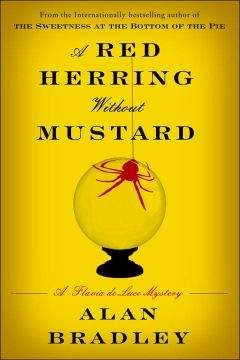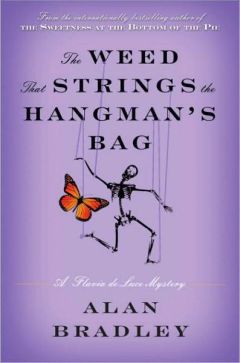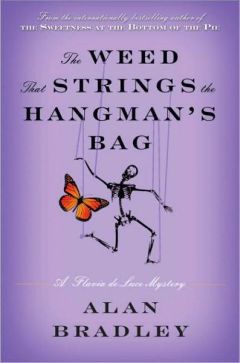Alan Bradley - A Red Herring Without Mustard: A Flavia de Luce Novel

Скачивание начинается... Если скачивание не началось автоматически, пожалуйста нажмите на эту ссылку.
Жалоба
Напишите нам, и мы в срочном порядке примем меры.
Описание книги "A Red Herring Without Mustard: A Flavia de Luce Novel"
Описание и краткое содержание "A Red Herring Without Mustard: A Flavia de Luce Novel" читать бесплатно онлайн.
“BUT HOW IS SHE?” I asked. “Fenella, I mean—really?”
“She’ll do,” said Dr. Darby.
We were motoring home to Bishop’s Lacey, the doctor’s Morris humming happily along between the hedgerows like a sewing machine on holiday.
“Fractured skull,” he went on when I said nothing. “Depressed occipital condylar fracture, as we quacks call it. Has quite a ring to it, doesn’t it? Thanks to you, we were able to get her into the operating room in time to elevate the broken bit without too much trouble. I think she’ll likely make a full recovery, but we shall have to wait and see. Are you all right?”
He hadn’t missed the fact that I was sucking in great deep breaths of the morning air, in an attempt to clear my system of cigarette smoke and the horrid odors of the hospital. The formalin of the morgue hadn’t been too bad—quite enjoyable, in fact—but the reek of cabbage soup from the kitchen had been enough to gag a hyena.
“I’m fine, thank you,” I said, with what I’m afraid was rather a wan smile.
“Your father will be very proud of you—” he went on.
“Oh, please don’t tell him! Promise you won’t!”
The doctor shot me a quizzical glance.
“It’s just that he already has so much to worry about—”
As I have said, Father’s financial distress was no secret in Bishop’s Lacey, particularly to his friends, of whom Dr. Darby was one. (The vicar was the other.)
“I understand,” the doctor said. “Then he shall not hear it from me.
“Still,” he added with a chuckle, “the news is bound to get about, you know.”
I could think of nothing but to change the subject.
“I’m rather puzzled about something,” I said. “The police took Fenella’s granddaughter, Porcelain, to see her in the hospital. She claims Fenella told her it was me who bashed her on the head.”
“And did you?” the doctor asked slyly.
“Later,” I said, ignoring his teasing, “the vicar told me that he, too, had paid a visit, but that Fenella had not yet regained consciousness. Which of them was telling the truth?”
“The vicar is a dear man,” Dr. Darby said. “A very dear man. He brings me flowers from his garden now and then to brighten up my surgery. But if cornered, I would have to admit that sometimes, on the wards, we are forced to tell him fibs. Little lies in little white jackets. For the good of the patient, of course. I’m sure you understand.”
If there was one thing in the world that I understood above all others, it was withholding selected snippets of the truth. It would not be an exaggeration to say that I was an Exalted Grand Master of the craft.
I nodded my head modestly. “He is very devoted to his work,” I said.
“As it happens, I was present when both the granddaughter and the vicar came to the hospital. Although the vicar didn’t get as far as her room, Mrs. Faa was fully conscious at the time of his visit.”
“And Porcelain?”
“At the time of Porcelain’s visit, she was not. The victims of skull fracture, you see, can slip in and out of consciousness as easily as you and I move from one room to another—an interesting phenomenon when you come right down to it.”
But I was hardly listening. Porcelain had lied to me.
The witch!
There’s nothing that a liar hates more than finding that another liar has lied to them.
“But why would she blame it on me?”
The words must have slipped out. I’d had no intention of thinking aloud.
“Ah,” said Dr. Darby. “ ‘There are more things in heaven and earth, Horatio, than are dreamt of in your philosophy.’ Meaning that people can behave strangely in times of great stress. She’s a complicated young woman, your friend Porcelain.”
“She’s no friend of mine!” I said rather abruptly.
“You took her in and fed her,” Dr. Darby said with an amused look. “Or perhaps I misunderstood.”
“I felt sorry for her.”
“Ah. No more than sorry?”
“I wanted to like her.”
“Aha! Why?”
The answer, of course, was that I was hoping to make a friend, but I could hardly admit that.
“We always want to love the recipients of our charity,” the doctor said, negotiating a sharp bend in the road with a surprising demonstration of steering skill, “but it is not necessary. Indeed, it is sometimes not possible.”
Suddenly I found myself wanting to confide in this gentle man—to tell him everything. But I could not.
The best thing for it when you feel tears coming on for no reason at all is to change the subject.
“Have you ever heard of the Red Bull?”
“The Red Bull?” he asked, swerving to avoid a terrier that had dashed out barking into the road. “Which Red Bull did you have in mind?”
“Is there more than one?”
“There are many. The Red Bull at St. Elfrieda’s is the first that comes to mind.”
A smile crept over his face, as if he was recalling a cozy evening of darts and a couple of pleasant pints of half-and-half.
“And?”
“Well, let me see … there was the Red Bull on a Green Field, from Kim, which was the god of nine hundred devils … the Red Bull of the Borgias, which was a flag, and was on a field of gold, not green … the notorious Red Bull playhouse that burned in the Great Fire of London in 1666 … there was the mythical Red Bull of England that met the Black Bull of Scotland in a fight to the death … and, of course, in the days when priests practiced medicine, they used to hand out the hair of a red bull as a cure for epilepsy. Have I missed any?”
Not one of these seemed likely to be the Red Bull that had attacked Fenella.
“Why do you ask?” he said, seeing my obvious puzzlement.
“Oh, no reason,” I said. “It was just something I heard somewhere … the wireless, perhaps.”
I could see that he didn’t believe me, but he was gentleman enough not to press.
“Here’s St. Tancred’s,” I said. “You can let me off at the churchyard.”
“Ah,” said Dr. Darby, applying the Morris’s brakes. “Time for a spot of prayer?”
“Something like that,” I said.
Actually, I needed to think.
Thinking and prayer are much the same thing anyway, when you stop to think about it—if that makes any sense. Prayer goes up and thought comes down—or so it seems. As far as I can tell, that’s the only difference.
I thought about this as I walked across the fields to Buckshaw. Thinking about Brookie Harewood—and who killed him, and why—was really just another way of praying for his soul, wasn’t it?
If this was true, I had just established a direct link between Christian charity and criminal investigation. I could hardly wait to tell the vicar!
A quarter mile ahead, and off to one side, was the narrow lane and the hedgerow where Porcelain had hidden in the bushes.
Almost without realizing it, I found my feet taking me in that direction.
If her claim about Fenella had been a lie, she couldn’t really have been afraid of me, as she had pretended. There must, then, have been some other reason for her ducking into the hedgerow—one that I had not thought about at the time.
If that was the case, she had successfully tricked me.
I climbed over the stile and into the lane. It had been just about here that she’d slipped into the shrubbery. I stood for a moment in silence, listening.
“Porcelain?” I said, the hair at the back of my neck rising.
Whatever had made me think that she was still here?
“Porcelain?”
There was no answer.
I took a deep breath, realizing it could easily be my last. With Porcelain, you could always so quickly find yourself with a knife at your throat.
Another deep breath—this one for insurance purposes—and then I stepped into the hedgerow.
I could see at once that there was nobody hidden here. A slightly flattened area and a couple of trampled weeds indicated clearly where Porcelain had squatted the other day.
I crouched beneath the branches and wiggled myself into the same position that she must have assumed, putting myself in her shoes, looking out at the world as if from her eyes. As I did so, my hand touched something solid … something hard.
It was shoved inside a little tent of weeds. I wrapped my fingers round the object and pulled it into view.
It was black and circular, perhaps a little over three inches in diameter, and was made of some dark, exotic wood—ebony, perhaps. Carved into its circumference were the signs of the zodiac. I ran my forefinger slowly across the carved image of a pair of fish lying head to tail: Pisces.
The last time I had seen this wooden ring was at the fête. It had been on the table in Fenella’s tent, supporting her crystal ball.
There was little doubt that Porcelain had pinched the ball’s base from the caravan, and was making off with it when I had surprised her in the lane.
But why? Was it a souvenir? Did it have some sentimental attachment?
Porcelain was simply infuriating. Nothing that she did made any sense.
Finding the base reminded me that the ball itself, hidden safely away in plain sight among my laboratory glassware, was still awaiting careful study.
My intention had been to examine it for fingerprints, even though most traces had likely been washed away by immersion in the river. I remembered how Philip Odell, the wireless detective, had once pointed out to Inspector Hanley that the glandular secretions of the palms and fingers consisted primarily of water and water-soluble solids.
“So you see, Inspector,” he had said, “Garvin’s fatal mistake was in running his fingers through his hair. The barber had scented it with brilliantine containing bay oil, which, of course, is soluble in alcohol, but not in water. Even after a night at the bottom of the millstream, the fingerprints on the handle of the knife were still plain enough to put his villainous neck in a noose.”
Philip Odell aside, I had my own ideas about underwater fingerprints. There was, for instance, a quite readily available household substance that would fix and harden any traces of residual grime that might be left by a killer’s hands. Given time, I would do the laboratory work, write it up, and present it to Inspector Hewitt on a silver platter. He would, of course, take my paper home at once and show it to his wife, Antigone.
But there had been no time. The compulsory cinema night and choir practice at St. Tancred’s, followed by my visit to Fenella in hospital, had robbed me of the opportunity to carry out the necessary research.
I would hurry home and begin at once.
I had no more than one foot out of the thicket when I heard the sound of an approaching motor. I ducked back into hiding, remembering to turn my face away as the thing swept past. By the time I judged it safe to come out again, the machine had vanished in the direction of Buckshaw.
I did not actually spot the Inspector’s blue Vauxhall until I had already set foot between the griffins of the Mulford Gates. It was parked off to one side beneath the chestnuts, and he was leaning patiently against it, waiting.
Too late now to turn and bolt. I’d have to make the best of it.
“Oh, Inspector,” I said, “I was just about to ring you up and tell you what I’ve found!”
I was aware that I was gushing, but I didn’t seem to be able to help myself. I held the wooden base out to him at arm’s length.
“This was in a thicket by the side of the lane. I think it’s part of Fenella’s crystal ball.”
He pulled a silk handkerchief from his breast pocket and took the wooden O from my hands.
“You shouldn’t have touched it,” he said. “You ought to have left it where it was.”
“I realize that,” I told him. “But it was too late. I touched it before I saw it—without meaning to. It was hidden under some weeds. I’d just stepped into the bushes for a moment …”
The look on his face told me that I was skating on thin ice: I had already used the “sudden call of nature” excuse, and it wouldn’t bear repeating.
“You saw me, of course, didn’t you? That’s why you stopped and waited for me here.”
The Inspector ignored this neat bit of deduction.
“Get in, please,” he said, holding open the back door of the Vauxhall. “It’s time for a talk.”
Sergeant Graves turned round and shot me a quick, quizzical glance from the driver’s seat, but he did not smile. Only then did I realize how much trouble I was in.
We drove to the front door of Buckshaw in silence.
It was my second full confession in as many days.
We were sitting in the drawing room—all of us, that is, except Father, who was standing at the window, staring out, as if his life depended on it, across the ornamental lake.
He had insisted that we all of us be present, and had summoned Feely and Daffy, both of whom had annoyingly come at once, and were now seated primly side by side on a flowered divan like a couple of toads come to tea.
“It is regrettable,” Inspector Hewitt was saying, “that our investigation has been so badly compromised. Crime scenes disturbed … evidence tampered with … crucial information withheld … I hardly know where to begin.”
He was talking about me, of course.
“I have tried to impress upon Flavia the seriousness of these matters, but with little success. Therefore, I’m afraid I’m going to insist, Colonel de Luce, that until such time as our work is complete, you keep her confined to Buckshaw.”
I couldn’t believe my ears! Confined to Buckshaw? Why not have me transported to Australia and be done with it?
Well, so much for choir duty and future cinema nights. So much for Father’s decree that we needed to get out more as a family.
Father mumbled something and shifted his gaze from the ornamental lake to the distant hills.
“That said,” the Inspector went on, “we come to the real reason for our being here.”
Real reason? My heart sank as if it already knew something that I did not.
The Inspector brought out his notebook. “A statement has been taken from a Miss Ursula Vipond, who says that she witnessed the removal from the river of what she described as …” He opened the notebook and flipped through a couple of pages. “… a glass sphere …”
My eyes widened.
“… by a child whose name she has reason to believe is Flavia de Luce.”
Confound the woman! I knew at once that this busybody could be none other than that troll, Ursula, who haunted Vanetta Harewood’s cottage in Malden Fenwick. I’d listed the odious creature in my notebook, but hadn’t known her surname.
She’d been standing hidden among the bushes at the Palings, watching as I pulled Fenella’s crystal ball from the river.
“Well?”
I could tell by his tone that the Inspector was becoming impatient.
“I was going to give it to you straightaway,” I said.
“Where is it?” he asked.
“In my laboratory. I’ll go get it and—”
“No! Stay as you are. Sergeant Graves will see to it.”
Surprised, the sergeant broke off gazing at Feely and leapt to his feet.
Подписывайтесь на наши страницы в социальных сетях.
Будьте в курсе последних книжных новинок, комментируйте, обсуждайте. Мы ждём Вас!
Похожие книги на "A Red Herring Without Mustard: A Flavia de Luce Novel"
Книги похожие на "A Red Herring Without Mustard: A Flavia de Luce Novel" читать онлайн или скачать бесплатно полные версии.
Мы рекомендуем Вам зарегистрироваться либо войти на сайт под своим именем.
Отзывы о "Alan Bradley - A Red Herring Without Mustard: A Flavia de Luce Novel"
Отзывы читателей о книге "A Red Herring Without Mustard: A Flavia de Luce Novel", комментарии и мнения людей о произведении.






